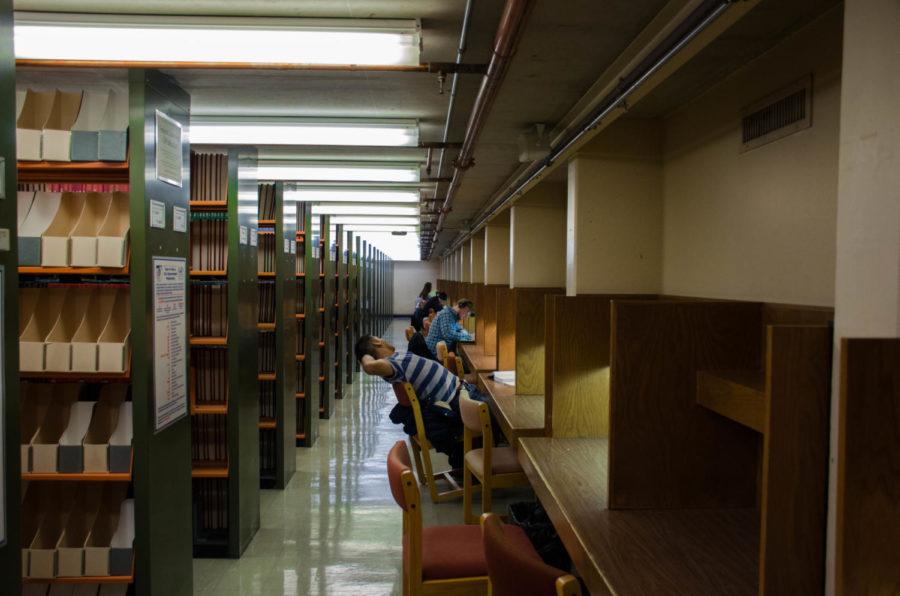Parks online feature presents valuable tools for students
Students study in tier 2. Tucked away inside Parks Library, ISU students can find peace and solitude, ideal for study. The tiers are also home to books not found on the normal floors in the library.
February 3, 2015
Parks Library may be one of the most daunting places for new students to navigate. The online aspect of the library can be even more complicated to understand without any direction.
Susan Vega-Garcia, associate professor and head of instruction at Parks Library, spoke to new graduate students at their orientation on Jan. 26, as well as at the “Everything you need to know about the library but we’re too afraid to ask” workshop on Jan. 29.
Vega-Garcia spoke in depth about the digital repository and how students can increase their online presence by utilizing the university’s database.
“The digital repository is a place where you can place your scholarly creations,” Vega-Garcia said. “Your research becomes really findable, which instantly increases accessibility.”
The database makes research done by students at Iowa State accessible around the world, with downloads of publications happening internationally every day.
“We have a tremendous push for digital collections. You’ll find hundreds of subject-focused indexes linked in the library website,” Vega-Garcia told graduate students. “These are the major finding tools that are going to connect you to research material in your subject area.”
Although the focus of the workshop was on graduate students and their research, undergraduate students need assistance with utilizing the library.
Cassidy Boe, a transfer student in pre-dietetics, came to Iowa State not knowing much about the online aspect of Parks Library.
Boe’s orientation as a transfer student did not have a section about the library, so she relied on her friends to show her around.
“I know the tiers are supposed to be silent, I know you can print there and I know a little bit about the murals,” Boe said about the Grant Wood paintings found throughout the library.
Boe knows little about the library website and the research that is accessible through it.
The website contains the university’s most current research materials, all of which are available to students.
According to the website, faculty members have access to online course guides as well. Instructors can “tailor resource lists for specific projects or assignments and also arrange for the librarian to deliver in-class instruction sessions and work individually with students needing research assistance.”
These guides can help instructors provide discipline-specific research databases to their students.
“We’ve put together research guides in specific subject areas,” Vega-Garcia said.
Vega-Garcia also spoke about subject librarians, who can provide in-depth knowledge in specific areas of research, all of which are listed on the library website.
The library website has 77 subject librarians listed, ranging from topics like LGBT studies to kinesiology to aerospace engineering.
“I strongly encourage every one of you to find your subject librarian,” Vega-Garcia said.
Students at home or off campus can access e-journals and databases as well if they set up a library account. This will give students access to the library’s subscriptions if they want to do research some place other than the library.
“We had something similar to a research database for students in my hometown high school, but nothing like this,” Boe said.
Even though this most recent workshop has already happened, other opportunities for learning about the library are available.
The Endnote Web workshop will deal with a software tool that allows you to store citations for research projects. Vega-Garcia described the website as a shoebox of research notes that won’t get lost. The upcoming Altmetric workshop will deal with how to utilize another online research database.
More information on these sessions can be found on the Iowa State website’s event page. Both the Endnote Web and the Altmetrics workshops will take place later this spring.







